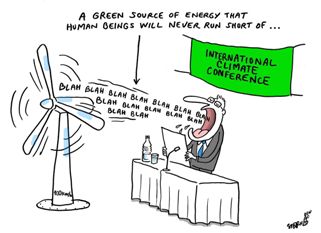Our low carbon economy, in the hands of politicians

Despite companies’ best efforts to find economic opportunities in climate change, they will not get far without a global political deal
The Climate Group turned four years old this month, giving me pause for thought on how far global understanding and engagement on climate change has evolved and what lies ahead.
Our anniversary coincided with a webinar we hosted for our corporate leaders group that reinforced the crossroads we could be approaching in terms of our global response to climate change. In the webinar, Shell presented its newly published energy scenarios, Scramble and Blueprints, that predict contrasting ways in which the global community will react to the threat of climate change and the resulting impact on emissions reductions by 2050.
Under the “Scramble” scenario, governments are slow to react to global warming, the focus is on controlling supply and fossil fuels continue to dominate the energy mix. It is a future where easy, opportunistic solutions, such as biofuels, are adopted and make some progress in reducing carbon emissions but do not deliver long-term solutions.
Against this, the “Blueprints” scenario portrays a more orderly world where joined-up thinking and proactive polices develop nationally and proliferate globally; where corporations and consumers support the growth of low-carbon technologies, such as electric vehicles; where grass-roots initiatives, such as small-scale renewables, take off. It also assumes a global political agreement on carbon reductions post-2012 that supports a long-term cost of carbon, which would enable carbon markets to bloom and businesses to factor in the price of emissions.
Scramble vs Blueprints presents us with a choice, and it seems clear that Blueprints would be the favored scenario by leading businesses for two main reasons. Firstly, clear international policy that enabled the development of stable carbon markets would provide a firmer foundation for factoring carbon into long-term strategic decision making.
Secondly, targeted sectoral policy would provide a level platform for competition within different industries. Although many leading companies are taking voluntary action to lower their carbon footprint, when their competitors are not under any obligation to do the same it can put them at an economic disadvantage.
Creating rules for the game in a carbon-constrained world will ensure good practice becomes the accepted minimum requirement.
Plainly Blueprints lights a more appealing road to follow that Scramble. Where we stand on this road right now is less clear: Shell’s model is released at a time of great uncertainty over the future direction of climate action.
Whilst there continue to be many positive corporate announcements and policy developments on climate, the current economic turndown could encourage the prioritisation of actions with shorter-term benefits. With 18 months to go until a global deal to succeed the Kyoto Protocol (arguably the most important pre-requisite for Blueprint) has to be agreed, positions among the main world economies are still divergent.
Shell’s announcement last week that it is pulling its stake in one of the world’s largest offshore wind farms – a move that is likely to delay the project – also reinforces the climate of ambiguity.
It is worth emphasising that even Shell’s more optimistic Blueprints scenario offers little cause for comfort, since it only predicts that carbon-dioxide levels can be brought below 550ppm. The latest scientific studies find that 549ppm could mean large areas of Florida and Bangladesh stand to be lost to rising sea-levels, so we need to aim for carbon-dioxide levels that are significantly below this.
Nicholas Stern announced recently that he too had underestimated the threat of climate change in his 2006 report. What is clear is that both governments and companies need to work together even harder than a Blueprints scenario suggests.
This may require unpopular decisions that create cost increases now. However, if analysis from Stern and McKinsey is correct, the short-term economic hits will be substantially less painful than throwing money at the problem when it reaches a crisis point.
In tipping the scales away from Scramble, the success of global leadership is paramount. As the Blueprints scenario notes: “In an increasingly transparent world, high-profile local actors soon influence the national stage.”
Encouragingly, and in line with The Climate Group’s own commitment to accelerate such leadership, this reality is already unfolding. At a state level, Arnold Schwarzenegger has cast himself as a real-life emissions Terminator in California, implementing bold policies that have thrust the state into a leadership position both in North America and around the world. On the corporate landscape, high-profile “actors” also exist whose influence extends will beyond their own organisations: Virgin’s Sir Richard Branson and Wal-Mart’s Lee Scott have taken up the challenge and proactively demonstrated the business opportunities involved in addressing climate change.
Newer low-carbon leaders are also emerging on the scene from the investment and entrepreneurial communities. For example, tech entrepreneurs like Shai Agassi (former president of the Products and Technology Group, SAP AG) are making mass solutions such as electric cars a reality through ‘Project Better Place’. Our increasingly interconnected world needs to broaden this base-level of leadership and ambition to every sector, from ICT to engineering, if we are to entertain a chance of achieving the Blueprints scenario.
Above all, the one aspect fundamental to our future ability to get on the right road and start running is a global political Blueprint – a robust global agreement, the essential framework of which needs to be signed off by the end of 2009. As the G8 meets in July in Japan, we must hope that high-profile local actors emerge to accelerate the political momentum required to break the deadlock around such a deal, ensuring the climate baton passed to Yasuo Fukuda from Angela Merkel and Tony Blair does not fall. Without a global deal, it is impossible to imagine anything but Scramble.
More information about Shell energy scenarios is available here
You can return to the main Market News page, or press the Back button on your browser.

